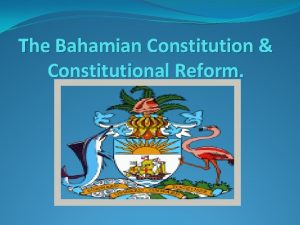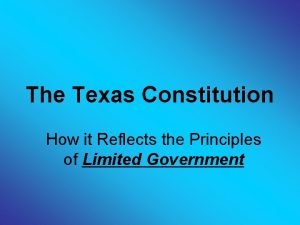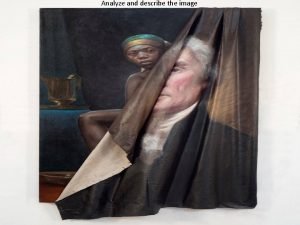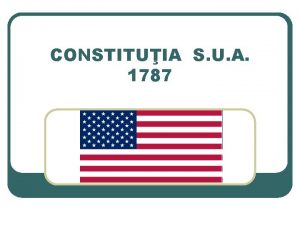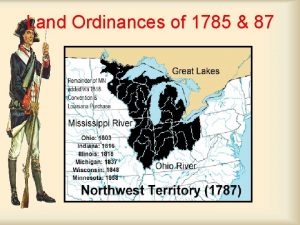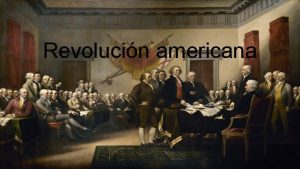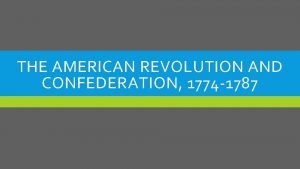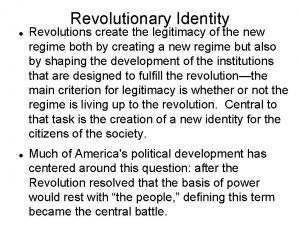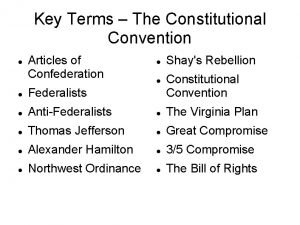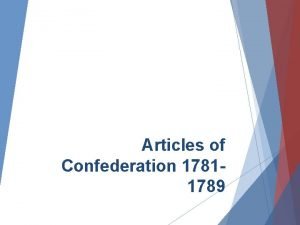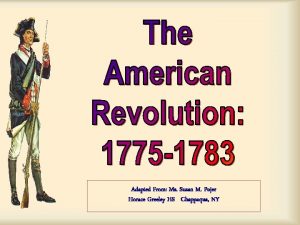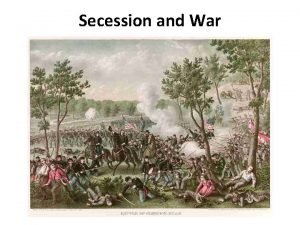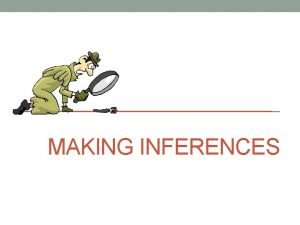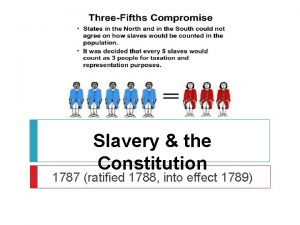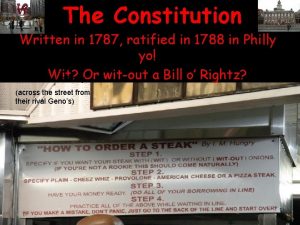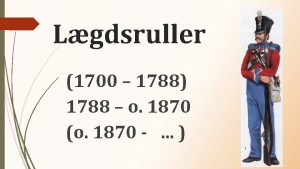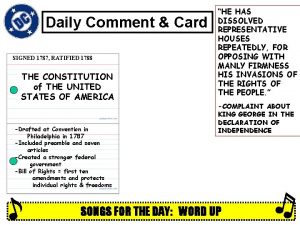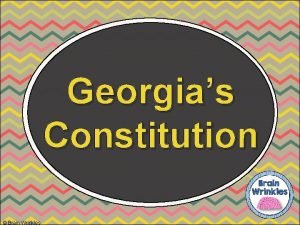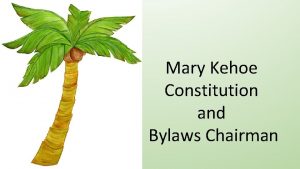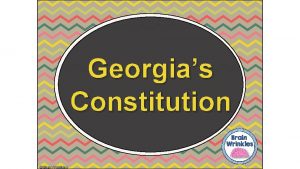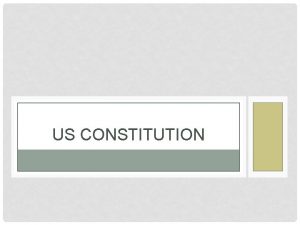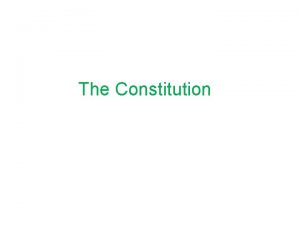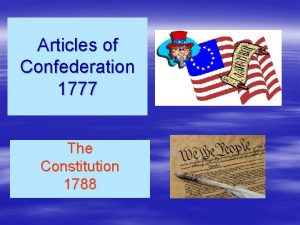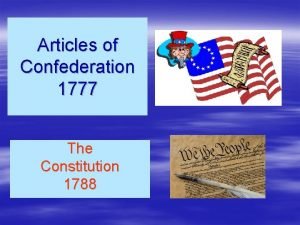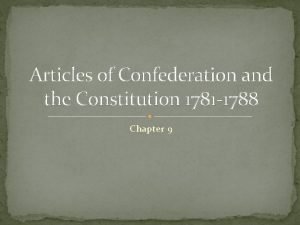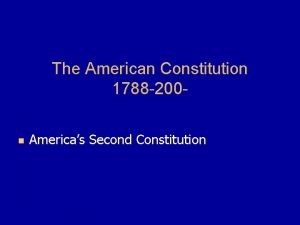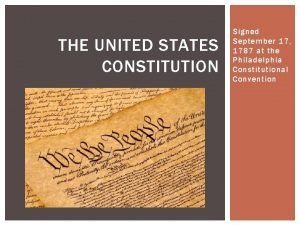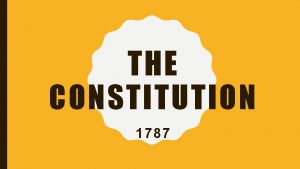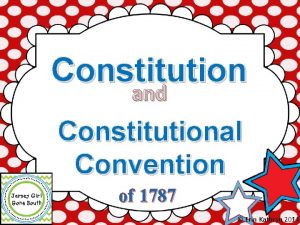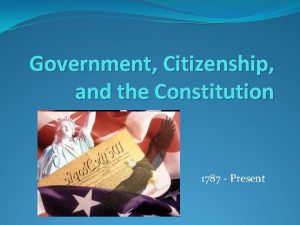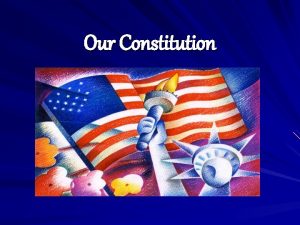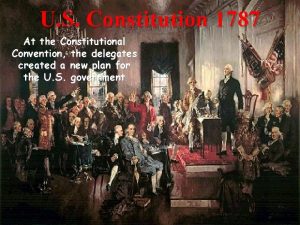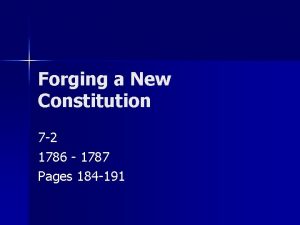The Making of the Federal Constitution 1787 1788



























- Slides: 27

The Making of the Federal Constitution 1787 -1788

1776: Declaration of Independence from Great Britain 1775 -81: Revolutionary War 1783: Treaty of Paris 1776 -77: Individual states drafted their own constitutions. Important points about these constitutions: --fear of tyranny --belief that only elected legislatures had the right to tax Characteristics of early state constitutions: --three branches of government, two-house legislatures, frequent elections, limits on power of governor.

1781 -87: Articles of Confederation --Declared existence of United States of America. --No executive or judicial branch. --Congress as a meeting ground of states. --Congress could make foreign policy and declare war. --Congress had no power to levy taxes or regulate trade between the states. Many in the states saw no problem with this, but nationalist movement growing, viewing the system as inadequate.

The Philadelphia Convention, Summer 1787 • Original mission: to revise the Articles of Confederation • 55 men from 12 states (Rhode Island refused to send a delegation) • Conspicuously absent were: – Thomas Jefferson (in Paris, as minister to France) – John Adams (in London, as minister to Great Britain) – Patrick Henry (stayed home because he “smelt a rat”) • Conspicuously present were: – – George Washington Benjamin Franklin James Madison Alexander Hamilton

Decided early on, scrap Articles of Confederation, draw up new Constitution Significant questions at convention: --Representation in Congress: equal for every state, or proportional to population? --How should representatives to Congress be chosen? --Balance of power between national and state legislatures? --Chief executive: one person or three? --Means of choosing chief executive? --Should slaves be counted for figuring a state’s representation? For figuring a state’s share of proportional taxation? --Should the national government have power to outlaw the slave trade?

Fundamental debate, between “nationalists” and “federalists” Nationalists: Those with a vision of a strong and centralized nation-state. (Note: From the following year onward, these people would seize hold of the name “Federalists” for themselves. ) Alexander Hamilton (NY), James Madison (VA) Federalists: Those with a vision of an association of states, with real power still resting in the state governments. Roger Sherman (CT), William Paterson (NJ), Luther Martin (MD)

Virginia Plan, introduced May 29 by Edmond Randolph, largely drafted by James Madison: --two-house legislature. -lower house popularly elected -upper house chosen by lower house --representation proportional by state population --Congress to elect the president --Congressional veto over state laws

New Jersey Plan, introduced June 15 by William Paterson --one-house Congress --equal representation for states --basically a revised Articles of Confederation with some new taxation and regulatory powers

Heated debate over means of representation in Congress Connecticut Compromise, agreed July 16: --lower house proportional by state --upper house equal for each state

Resolutions involving slavery: --Three Fifths Compromise: Every five slaves to count as three persons for both representation and taxation --Congress able to outlaw slave trade but no sooner than 1808

Excerpt from James Madison’s Notes, June 6 Mr. SHERMAN. If it were in view to abolish the State Govts. the elections ought to be by the people. If the State Govts. are to be continued, it is necessary in order to preserve harmony between the National & State Govts. that the elections to the former shd. be made by the latter. The right of participating in the National Govt. would be sufficiently secured to the people by their election of the State Legislatures. The objects of the Union, he thought were few. 1. defence agst. foreign danger. 2. agst. internal disputes & a resort to force. 3. Treaties with foreign nations. 4. regulating foreign commerce, & drawing revenue from it. These & perhaps a few lesser objects alone rendered a Confederation of the States necessary. All other matters civil & criminal would be much better in the hands of the States. The people are more happy in small than large States may indeed be too small as Rhode Island, & thereby be too subject to faction. Some others were perhaps too large, the powers of Govt. not being able to pervade them. He was for giving the General Govt. power to legislate and execute within a defined province. Col. MASON. Under the existing Confederacy, Congs. represent the States not the people of the States: their acts operate on the States, not on the individuals. The case will be changed in the new plan of Govt. The people will be represented; they ought therefore to choose the Representatives. The requisites in actual representation are that the Reps. should sympathize with their constituents; shd. think as they think, & feel as they feel; and that for these purposes shd. even be residents among them. Much he sd. had been alledged agst. democratic elections. He admitted that much might be said; but it was to be considered that no Govt. was free from imperfections & evils; and that improper elections in many instances, were inseparable from Republican Govts. But compare these with the advantage of this Form in favor of the rights of the people, in favor of human nature. He was persuaded there was a better chance for proper elections by the people, if divided into large districts, than by the State Legislatures. Paper money had been issued by the latter when the former were against it. Was it to be supposed that the State Legislatures then wd. not send to the Natl. legislature patrons of such projects, if the choice depended on them.

June 27: Mr. L. MARTIN contended at great length and with great eagerness that the General Govt. was meant merely to preserve the State Governts. : not to govern individuals: that its powers ought to be kept within narrow limits; that if too little power was given to it, more might be added; but that if too much, it could never be resumed: that individuals as such have little to do but with their own States; that the Genl. Govt. has no more to apprehend from the States composing the Union, while it pursues proper measures, that a Govt. over individuals has to apprehend from its subjects: that to resort to the Citizens at large for their sanction to a new Governt. will be throwing them back into a State of Nature: that the dissolution of the State Govts. is involved in the nature of the process: that the people have no right to do this without the consent of those to whom they have delegated their power for State purposes: through their tongue only they can speak, through their ears, only, can hear: that the States have shewn a good disposition to comply with the Acts, of Congs. weak, contemptibly weak as that body has been; and have failed through inability alone to comply: that the heaviness of the private debts, and the waste of property during the war, were the chief causes of this inability: that he did not conceive the instances mentioned by Mr. Madison of compacts between Va. & Md. between Pa. & N. J. or of troops raised by Massts. for defence against the Rebels, to be violations of the articles of confederation-that an equal vote in each State was essential to the federal idea, and was founded in justice & freedom, not merely in policy: that tho' the States may give up this right of sovereignty, yet they had not, and ought not: that the States like individuals were in a State of nature equally sovereign & free. In order to prove that individuals in a State of nature are equally free & independent he read passages from Locke, Vattel, Lord Summers. Priestly.

To prove that the case is the same with States till they surrender their equal sovereignty, he read other passages in Locke & Vattel, and also Rutherford: that the States being equal cannot treat or confederate so as to give up an equality of votes without giving up their liberty: that the propositions on the table were a system of slavery for IO States: that as Va. Masts. & Pa. have 42/90 of the votes they can do as they please without a miraculous Union of the other ten: that they will have nothing to do, but to gain over one of the ten to make them compleat masters of the rest: that they can then appoint an Execute. & Judiciary & legislate for them as they please: that there was & would continue a natural predilection & partiality in men for their own States; that the States, particularly the smaller, would never allow a negative to be exercised over their laws: that no State in ratifying the Confederation had objected to the equality of votes; that the complaints at present run not agst. this equality but the want of power; that 16 members from Va. would be more likely to act in concert than a like number formed of members from different States; that instead of a junction of the small States as a remedy, he thought a division of the large States would be more eligible. This was the substance of a speech which was continued more than three hours. He was too much exhausted he said to finish his remarks, and reminded the House that he should tomorrow, resume them.

Key elements of Constitution: --federalism --enumerated powers --checks and balances --separation of powers

"I confess that there are several parts of this constitution which I do not at present approve, but I am not sure I shall never approve them. The older I grow, the more apt I am to doubt my own judgment, and to pay more respect to the judgment of others. . For when you assemble a number of men to have the advantage of their joint wisdom, you inevitably assemble with those men, all their prejudices, their passions, their errors of opinion, their local interests, and their selfish views. From such an assembly can a perfect production be expected? It therefore astonishes me, Sir, to find this system approaching so near to perfection as it does; and I think it will astonish our enemies, who are waiting with confidence to hear that our councils are confounded like those of the Builders of Babel; and that our States are on the point of separation, only to meet hereafter for the purpose of cutting one another's throats. Thus I consent, Sir, to this Constitution because I expect no better, and because I am not sure, that it is not the best. . On the whole, Sir, I can not help expressing a wish that every member of the Convention who may still have objections to it, would with me, on this occasion doubt a little of his own infallibility, and to make manifest our unanimity, put his name to this instrument. " Benjamin Franklin to the convention, September 17, 1787

Selected points to discuss ARTICLE I: CONGRESS --Structural differences between House and Senate --Legislative relationship with the president --Powers granted and denied, Sections 8 -10

ARTICLE II: THE PRESIDENCY --Original plan of choosing a president --Accountability to Congress --Special relationship with the Senate ARTICLE III: THE JUDICIARY --Powers specified for Supreme Court --Latitude to Congress for creation of lower courts

ARTICLE IV: RELATIONS AMONG STATES --full faith and credit, privileges and immunities, extradition --reference to fugitive slaves ARTICLE V: PROCEDURE FOR AMENDMENT ARTICLE VI: SUPREME LAW OF THE LAND ARTICLE VII: METHOD OF RATIFICATION

Ratification debates in each state Substantial majority in Virginia, New York, and Massachusetts suspicious of strengthening the central government North Carolina and Rhode Island initially not even willing to call conventions Supporters of ratification took up the name “Federalists, ” and opponents came to be known as “Anti-Federalists. ”

October 7, 1787: To the Freemen of Pennsylvania The late revolution having effaced in a great measure all former habits, and the present institutions are so recent, that there exists not that great reluctance to innovation, so remarkable in old communities, and which accords with reason…. The wealthy and ambitious, who in every community think they have a right to lord it over their fellow creatures, have availed themselves, very successfully, of this favorable disposition; for the people thus unsettled in their sentiments, have been prepared to accede to any extreme of government; all the distresses and difficulties they experience, proceeding from various causes, have been ascribed to the impotency of the present confederation, and thence they have been led to expect full relief from the adoption of the proposed system of government, and in the other event, immediately ruin and annihilation as a nation. These characters flatter themselves that they have lulled all distrust and jealousy of their new plan, by gaining the concurrence of the two men in whom America has the highest confidence, and now triumphantly exult in the completion of their long meditated schemes of power and aggrandisement. I would be very far from insinuating that the two illustrious personages alluded to, have not the welfare of their country at heart, but that the unsuspecting goodness and zeal of the one, has been imposed on, in a subject of which he must be necessarily inexperienced, from his other arduous engagements; and that the weakness and indecision attendant on old age, has been practiced on in the other. --Anti-Federalist Samuel Bryan

Delaware: December 7, 1787 Pennsylvania: December 12, 1787 New Jersey: December 18, 1787 Georgia: January 2 , 1788 Connecticut: January 8, 1788 Massachusetts: February 6, 1788 Maryland: April 28, 1788 South Carolina: May 23, 1788 New Hampshire: June 21, 1788 Virginia: June 26, 1788 New York: July 26, 1788 April 30, 1789: Inauguration of George Washington North Carolina: November 21, 1789 Rhode Island: May 29, 1790

After New Hampshire, state #9, ratified, Virginia and New York were still needed for the Constitution to be viable. The Federalist Papers --John Jay, Alexander Hamilton, James Madison Anti-Federalists pamphlet authors --Brutus, believed to be disgruntled delegate Robert Yates of New York --Cato, maybe Gov. George Clinton of New York --Mercy Otis Warren of Massachusetts

Criticisms of the Anti-Federalists: House of Representatives: --Not nearly numerous enough to be truly representative --Powers too broad --Term of office should be one year, not two Senate: --Potentially aristocratic --Term should be shorter than six years --Consecutive terms should be prohibited --Should not have special power ratifying treaties and confirming appointees --Should not be involved in revenue bills

President: --Power as commander-in-chief questioned of armed services questioned --Power to veto laws and grant pardons questioned The government as a whole: --Standing army in peacetime feared --Power of taxation feared: some preferred requisition system --Suspicion of power to control elections to the House --Suspicion of electoral college system --“Necessary and proper” clause feared --No Bill of Rights

July 26, 1788: Ratification by New York February 4, 1789: Voting by electors March 4, 1789: Convening of new Congress in New York April 6, 1789: Official counting of vote, unanimous for George Washington April 30, 1789: Inauguration of George Washington

The new Constitution: --was ratified with a remarkable absence of physical strife; --established a system of amazing durability; but also: --contained the internal contradictions that would make for the American Civil War, 1861 -65 1. slavery, in a society that claimed to be founded on liberty and equality 2. a supposedly united nation with a central government, but divided into states claiming inviolable prerogatives to themselves.

Bill of Rights --First ten amendments to the Constitution. --Originally intended as a limit on the power of the national government. --Includes: --freedom of speech, press, religion, and assembly. --freedom from self-incrimination and unfair searches. --right to counsel. --Ninth and Tenth Amendments designed as extra safeguards against abuses of national power.
 Nc constitution vs us constitution
Nc constitution vs us constitution Constitution what is constitution
Constitution what is constitution The constitution lesson 1 principles of the constitution
The constitution lesson 1 principles of the constitution Texas constitution vs us constitution
Texas constitution vs us constitution Moses austin symbol
Moses austin symbol Northwest ordinance of 1787
Northwest ordinance of 1787 Constitutia sua 1787
Constitutia sua 1787 Northwest ordinance of 1787
Northwest ordinance of 1787 French revolution calender
French revolution calender Why was the french government bankrupt in 1787
Why was the french government bankrupt in 1787 Electoral college compromise 1787
Electoral college compromise 1787 Northwest ordinance of 1787
Northwest ordinance of 1787 Independencia eeuu
Independencia eeuu Constitutional convention 1787
Constitutional convention 1787 Northwest ordinance of 1787
Northwest ordinance of 1787 1787-1776
1787-1776 Northwest ordinance of 1787
Northwest ordinance of 1787 Usa 1787
Usa 1787 Northwest ordinance of 1787
Northwest ordinance of 1787 Northwest ordinance of 1787
Northwest ordinance of 1787 War making and state making as organized crime summary
War making and state making as organized crime summary Is making inference simply making a guess
Is making inference simply making a guess Tư thế ngồi viết
Tư thế ngồi viết Cái miệng bé xinh thế chỉ nói điều hay thôi
Cái miệng bé xinh thế chỉ nói điều hay thôi Mật thư tọa độ 5x5
Mật thư tọa độ 5x5 Bổ thể
Bổ thể Tư thế ngồi viết
Tư thế ngồi viết Thẻ vin
Thẻ vin

